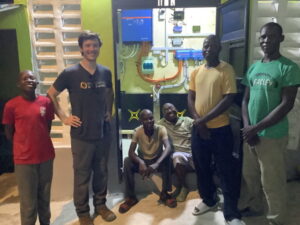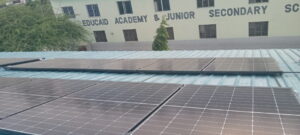 The expansion of renewable energies, especially photovoltaics, is steadily increasing. Nowadays, there is a suitable solution for almost every project – whether it’s a private home, public buildings, or commercial facilities. In some regions, however, reference projects or skilled workers are often lacking, making the installation of a PV system quite challenging. In Mombasa, Africa, the association EducAid Kenya e.V. faced the challenge of implementing a sustainable and cost-effective alternative to the expensive grid-supplied electricity for the EducAid Academy School. One thing quickly became clear: they wanted to invest in an own photovoltaic system.
The expansion of renewable energies, especially photovoltaics, is steadily increasing. Nowadays, there is a suitable solution for almost every project – whether it’s a private home, public buildings, or commercial facilities. In some regions, however, reference projects or skilled workers are often lacking, making the installation of a PV system quite challenging. In Mombasa, Africa, the association EducAid Kenya e.V. faced the challenge of implementing a sustainable and cost-effective alternative to the expensive grid-supplied electricity for the EducAid Academy School. One thing quickly became clear: they wanted to invest in an own photovoltaic system.
A total of 650 students are taught at the EducAid Academy in Mombasa. Every day, a hot meal is prepared for them and the 40 employees in the in-house kitchen. Since electricity from the grid is very expensive locally, gas or firewood was mainly used for this purpose. However, there has long been a desire to use a more sustainable energy source. A corresponding PV system on the school roof would produce enough electricity to cover the energy needed for cooking. The money saved could thus be used elsewhere, for example, in school materials.
 However, the actual planning was easier said than done. Simply due to the lack of reference objects to orient oneself by, which would have facilitated the construction of such a system. At the same time, there is a lack of skilled workers on site who are needed for commissioning. “We felt like we were calling half the world until we finally found open ears at IBC SOLAR,” says Dr. Gabriele Keßler, chairwoman of EducAid Kenya e.V. “The company founder and then CEO, Mr. Udo Möhrstedt, listened to our plan and immediately offered his help.” Subsequently, three association members visited the IBC SOLAR headquarters in Bad Staffelstein to discuss the details. In addition to a donation of, among other things, solar panels and storage units, IBC SOLAR also took over the planning of the PV system in close cooperation with our South African subsidiary.
However, the actual planning was easier said than done. Simply due to the lack of reference objects to orient oneself by, which would have facilitated the construction of such a system. At the same time, there is a lack of skilled workers on site who are needed for commissioning. “We felt like we were calling half the world until we finally found open ears at IBC SOLAR,” says Dr. Gabriele Keßler, chairwoman of EducAid Kenya e.V. “The company founder and then CEO, Mr. Udo Möhrstedt, listened to our plan and immediately offered his help.” Subsequently, three association members visited the IBC SOLAR headquarters in Bad Staffelstein to discuss the details. In addition to a donation of, among other things, solar panels and storage units, IBC SOLAR also took over the planning of the PV system in close cooperation with our South African subsidiary.
A year later, in May 2024, the 12.3 kWp system with a 42 kWh storage system was finally in operation. A separate building was erected for the technology, and a technician was hired for maintenance and upkeep to guarantee maximum yield. Since then, the school hardly needs any electricity from the public grid. The amount of electricity generated is not only sufficient for meal preparation. The drinking water treatment plant and the associated pumps are also operated with solar power on most days of the year. Additionally, the generated PV power is also used for the air conditioning in the teacher’s and principal’s office. The advantages of a PV system quickly became apparent: shortly after completion, there was a nationwide power outage, but the school remained unaffected.
With this project, the association EducAid Kenya e.V. achieved an absolute pioneering feat, as it turned out that the expansion of a solar-powered school kitchen in Mombasa was completely new territory. And the planning continues. The next step is to acquire more energy-efficient kitchen appliances that will further reduce electricity consumption.